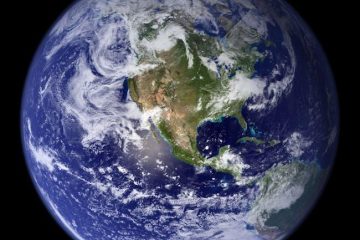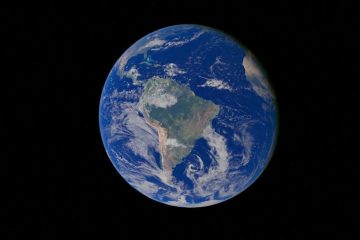Table of Contents
- Understanding the Gaia Hypothesis and Its Scientific Foundations
- Exploring the Critiques and Counterarguments of the Gaia Hypothesis
- The Role of Interconnectedness in Ecosystem Health and Stability
- Balancing Scientific Rigor with Ecological Philosophy
- Recommendations for Further Research and Public Engagement Strategies
- Q&A
- In Conclusion

Understanding the Gaia Hypothesis and Its Scientific Foundations
The Gaia Hypothesis proposes that Earth’s biological and inorganic components are interconnected, functioning collectively as a self-regulating system. Developed by James Lovelock in the 1970s, this concept suggests that life on Earth, including human beings, plays a crucial role in maintaining conditions that support life. The hypothesis challenges traditional views of nature as a mere collection of individual components influenced solely by external forces. Instead, it emphasizes a synergistic relationship, where living organisms interact cooperatively with the non-living environment to regulate essential factors such as temperature, pH, and atmospheric composition.
This perspective has sparked a myriad of debates within the scientific community. Critics argue that the hypothesis lacks empirical evidence and scientific rigor, labelling it as more of a philosophical standpoint than a scientific theory. Key points of contention include:
- The clarity and testability of the hypothesis
- The implications of equating Earth’s biosphere with a single organism
- The oversimplification of complex ecological interactions
Despite these criticisms, the Gaia Hypothesis has encouraged interdisciplinary research, merging ecology, biology, and Earth systems science. It has prompted scientists to consider the Earth as an integrated whole rather than fragmented elements. This holistic approach has led to insights, such as the impact of climate change on global ecosystems and the interdependence of species, fostering an environment where collaborative actions for environmental protection are not merely encouraged, but deemed necessary for sustaining the Earth’s delicate balance.

Exploring the Critiques and Counterarguments of the Gaia Hypothesis
The Gaia Hypothesis, which posits that Earth and its biological systems behave as a single self-regulating entity, has not been without its share of critiques. Critics often challenge the idea of the Earth as a cohesive system, suggesting that natural processes operate independently rather than being part of a unified organism. This perspective hinges on the belief that complex ecological interactions often arise from competition rather than cooperation, which undermines the hypothesis. Many scientists assert that interpreting Earth’s systems through a lens of biological interaction may lead to mistaken conclusions about ecological balance and sustainability.
Some counterarguments focus on the scientific basis of the hypothesis, arguing that it lacks rigorous predictive power and fails to adhere to the principles of scientific falsifiability. Critics emphasize that while the hypothesis does offer a thought-provoking framework for understanding Earth’s ecosystems, it is often criticized for being too vague to test scientifically. This raises questions about its place within the scientific community and whether it can be classified among established theories. Concerns about methodological issues include:
- Over-generalization of ecological phenomena.
- Lack of quantifiable metrics for assessing Gaia’s functionality.
- Potential anthropocentrism in viewing the Earth as a living being.
Moreover, the Gaia Hypothesis has ignited discussions within the realms of ethics and environmental policy. Supporters argue that adopting a Gaia-inspired perspective could promote greater respect for nature, while critics contend that it might lead to misguided conservation efforts. The following table illustrates some of these ethical implications:
| Perspective | Implication |
|---|---|
| Gaia Supporters | Argue for holistic environmental stewardship. |
| Gaia Critics | Emphasize the need for targeted scientific approaches. |

The Role of Interconnectedness in Ecosystem Health and Stability
The intricate web of life within ecosystems reveals a profound interconnectedness that is essential for maintaining health and stability. This complexity is illustrated through various interactions, not only among species but also between organisms and their physical environment. Healthy ecosystems depend on various relationships such as predation, competition, and mutualism which collectively support the balance necessary for survival. Each organism, from the smallest microorganism to the largest predator, plays a unique role in sustaining these systems, influencing nutrient cycling, energy flow, and even the resilience of the ecosystem to disturbances.
Moreover, the implications of this interconnectedness extend to the phenomenon of ecosystem resilience. When an ecosystem is disrupted—due to climate change, habitat destruction, or pollution—the intricate relationships between its components allow for a degree of recovery. Factors that enhance this resilience include:
- Diversity of species: Greater species diversity often leads to increased stability.
- Functional redundancy: Multiple species performing similar roles can buffer against loss.
- Adaptive capacity: Ecosystems that can adjust to changes are more likely to survive disruptions.
This interconnected framework is not only significant for ecological balance but also has profound implications for human society. The health of ecosystems directly impacts services that humans rely on, such as clean water, pollination of crops, and climate regulation. Therefore, understanding and preserving the interconnectedness within ecosystems becomes paramount to ensuring both biodiversity and the sustainability of resources essential for human life. Recognizing these connections can help guide conservation efforts, informing policies that foster a harmonious relationship between nature and human activities.

Balancing Scientific Rigor with Ecological Philosophy
In the ongoing debate surrounding the Gaia hypothesis, the challenge lies in striking a balance between empirical data and the philosophical underpinnings of ecological systems. Advocates of the Gaia theory argue that the Earth functions as a self-regulating entity, where biological and geological components interact in a way that maintains conditions suitable for life. This perspective invites scientists to consider broader ecological implications rather than isolating organisms or processes in traditional scientific inquiry. However, detractors emphasize a need for scientific rigor, warning that without robust quantitative evidence, the elegant theories proposed by Gaia proponents may risk becoming mere philosophical musings rather than scientifically validated models.
To navigate this intricate landscape, clear frameworks for evaluating ecological principles alongside scientific methodologies must be established. Scientists can incorporate elements of ecological philosophy that emphasize interconnectedness and sustainability without compromising the data-driven approaches vital for rigorous scientific study. This synthesis allows researchers to:
- Engage in interdisciplinary dialogue
- Utilize systems thinking to analyze ecological phenomena
- Foster innovative research methodologies that embrace both philosophy and empirical analysis
It is equally important to acknowledge the limitations inherent in both scientific and philosophical perspectives. Relying solely on quantitative data may overlook crucial qualitative insights, while an exclusive reliance on philosophical ethics can lead to speculative assertions that lack empirical support. A productive middle ground involves the implementation of collaborative research initiatives that merge scientists and ecologists with philosophers and ethicists. By forming partnerships that value each discipline’s strengths while being mindful of their limitations, the discourse surrounding the Gaia hypothesis can move forward, offering a more comprehensive view of our planet’s delicate ecosystems. Below is a simple table illustrating the contrasting elements of scientific rigor and ecological philosophy:
| Element | Scientific Rigor | Ecological Philosophy |
|---|---|---|
| Focus | Data-driven analysis | Interconnected systems |
| Methodology | Quantitative research | Qualitative insights |
| Objective | Establishing causality | Pursuing sustainability |

Recommendations for Further Research and Public Engagement Strategies
To deepen the understanding of the Gaia Hypothesis and its surrounding controversies, future research should focus on interdisciplinary approaches that incorporate both scientific and philosophical perspectives. This involves collaborative studies between ecologists, climate scientists, philosophers of science, and sociologists. Such partnerships can help illuminate the implications of the Gaia Hypothesis on current environmental challenges. Key areas for exploration include:
- Climate Change Impact: Investigating how the framework of the Gaia Hypothesis can inform climate resilience strategies.
- Biodiversity and Ecosystem Services: Analyzing the role of interconnected ecosystems and their responses to human activity.
- Philosophical Implications: Examining the ethical considerations that arise from viewing Earth as an integrated living system.
Public engagement strategies should aim to build broader awareness and encourage community involvement in discussions about the Gaia Hypothesis. Organizing interactive workshops, public forums, and collaborative citizen science projects can effectively bridge the gap between scientific literature and public understanding. In particular, consider:
- Educational Outreach: Develop curriculum materials that help students explore environmental interconnectedness and system thinking.
- Social Media Campaigns: Leverage platforms to share easy-to-digest content, infographics, and personal stories connecting individuals to ecological health.
- Community-Based Initiatives: Foster local projects that demonstrate the principles of the Gaia Hypothesis, such as urban greening efforts or conservation programs.
Additionally, a focused study on public perception and misconceptions surrounding the Gaia Hypothesis can provide valuable insights into outreach effectiveness. By gathering data through surveys and interviews, researchers can better understand community attitudes and knowledge gaps. The following table summarizes potential research themes and engagement tactics:
| Research Themes | Engagement Tactics |
|---|---|
| Ecological Interdependence | Workshops & Online Courses |
| Philosophical Perspectives | Public Debates & Discussions |
| Human Impact on Ecosystems | Citizen Science Projects |
Q&A
Q&A: Understanding the Gaia Hypothesis Controversy
Q: What is the Gaia Hypothesis? A: The Gaia Hypothesis, first proposed by scientist James Lovelock in the 1970s, suggests that the Earth functions as a self-regulating, complex system, where living organisms interact with their inorganic surroundings. This concept implies that life significantly influences the Earth’s environment and maintains conditions suitable for life.Q: Why is the Gaia Hypothesis controversial? A: The controversy arises primarily from its challenges to traditional biological and ecological principles. Critics argue that the hypothesis leans towards a form of biological determinism or teleology, implying that Earth has a goal of maintaining balance, which contradicts the randomness inherent in natural selection. Additionally, some scientists dispute the mechanistic nature of the interactions described in the hypothesis.
Q: What are some arguments in favor of the Gaia Hypothesis? A: Proponents argue that the hypothesis provides a holistic view of Earth’s systems, facilitating a better understanding of how life and the environment coalesce. Supporters often point to phenomena like climate regulation, ocean chemistry, and atmospheric balance as evidence of complex interdependencies that resemble the self-regulating systems predicted by Gaia.
Q: How has the scientific community responded to the Gaia Hypothesis? A: The scientific community is divided. Some support further exploration into Gaia-related concepts, advocating for integrative approaches that acknowledge the complex relationships between organisms and their environments. Others remain skeptical, insisting that it lacks empirical support and could detract from more proven ecological theories.
Q: Are there any practical implications of the Gaia Hypothesis? A: Yes, the Gaia Hypothesis has significant implications for environmental science and conservation. It encourages a systems-thinking approach, prompting insights into sustainability and biodiversity conservation. Many environmentalists adopt Gaia-inspired perspectives to advocate for more holistic environmental policies that consider both human and ecological needs.
Q: How has the perception of the Gaia Hypothesis evolved over the years? A: Initially met with skepticism and criticism, the Gaia Hypothesis has gained traction over time as interdisciplinary studies have illustrated the interconnectedness of ecosystems. Emerging fields like Earth system science and ecological resilience have provided frameworks that resonate with Gaia principles, fostering a nuanced debate that acknowledges both its merits and limitations.
Q: What future research directions could we see regarding the Gaia Hypothesis? A: Future research may focus on empirical testing of Gaia-like predictions, exploring how ecosystems respond to human impacts and climate change. Enhanced computational models and technology could also help simulate complex interactions, providing valuable data to better understand Earth’s self-regulating mechanisms in a changing world.
Q: In what way can laypeople engage with the ideas behind the Gaia Hypothesis? A: Laypeople can engage by fostering attitudes of stewardship toward the environment, recognizing the importance of biodiversity and the interconnectedness of life. Participating in local conservation efforts and advocating for sustainable practices can reflect the spirit of the Gaia Hypothesis in daily life.



0 Comments